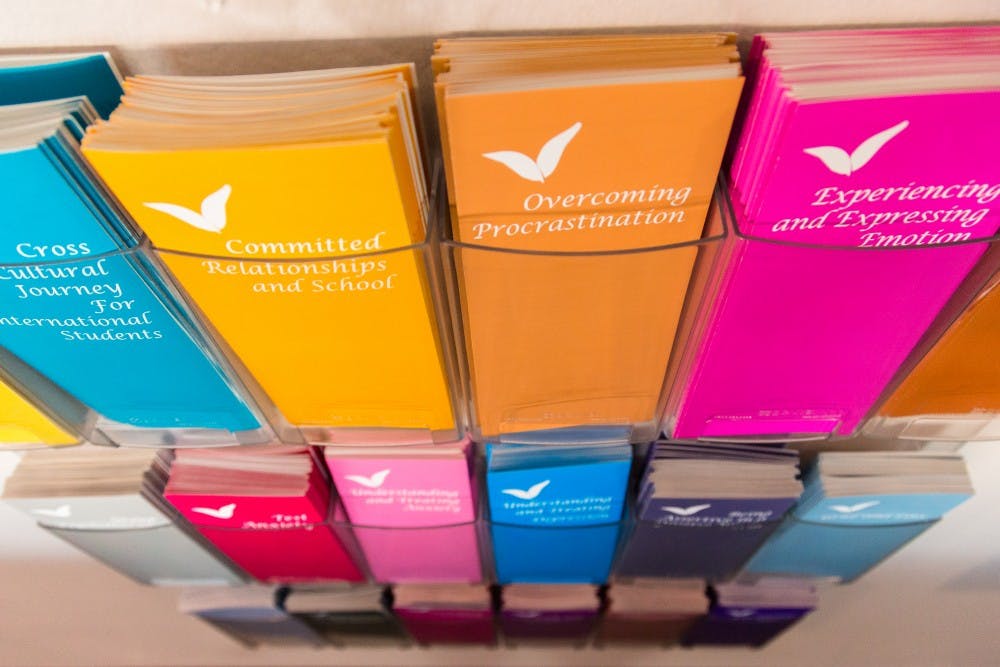College students always talk about having mental breakdowns or being on the verge of having one, and with good reason. Juggling classes, internships and sometimes a job, students nowadays are asked to do so much that it sometimes becomes overwhelming and eventually a troubling reality.
I can personally attest to that. But, I also believe the No. 1 person who can stop mental breakdowns and symptoms like stress, anxiety and depression is yourself.
For me, this semester started fine. During winter break, I had decided that this would be the semester that I would exceed my own expectations. I wanted to get involved so I applied and joined The State Press as an opinion columnist.
One day on my way home from class, it happened — I had a mental breakdown. As traffic inched forward, my heart began racing, my nails dug into my steering wheel and I broke into tears. And these weren’t “I just watched 'The Notebook'” tears. It was a feeling that I had never felt in my life; the overwhelming feeling of helplessness and anger were unbearable. I had finally succumbed to the stress that had been pulling at me from every which way. Sensing that I was about to fall into a terrible rut, I hesitantly sought professional help.
Unfortunately, my experience is more common than one would like it to be. A 2013 study by the Center for Collegiate Mental Health at Penn State showed that about 20 percent of college students seek counseling for a variety of mental health issues.
In response to my breakdown, I distanced myself from everything that brought about feelings of stress or anxiety. I didn’t even reach out to my editors at The State Press to notify them of the situation. To top it all off, my grades began to drop, too.
The truth is, external stresses have a drastic impact on a students’ academic well-being as it did with mine, according to a 2015 study by the American College Health Association, which surveyed over 93,000 college students.
The study shows that factors like sleep, anxiety, stress and depression are the ones that most students like myself have to grapple with despite being innately out of our immediate control and more than likely symptoms of necessary responsibilities that most college students have, such as a full-time job. A 2014 study by Georgetown University's Center on Education and Workforce showed that nearly 40 percent and 76 percent of undergraduate and graduate students respectively worked at least 30 hours per week.
I was looking for help, and I was lucky enough to come in contact with a professional counselor located not too far from campus. As I made my way to her office for my first appointment, thoughts of not being well or thinking I was crazy popped into my mind — part of the stigma that students fear when deciding if they should seek help. She greeted me at the door, and we immediately began talking. She explained to me that these feelings weren't good, but they were normal. She told me that a majority of the college-aged students she sees come in with anxiety and stress-related problems. A 2014 study by The Association for University and College Counseling Center Directors shows how depression and anxiety have become an overwhelming reason why students seek counseling.
Toward the end of the session, I felt enlightened. One thing that stuck out to me, and something that every college student should keep in mind, is that these negative feelings, save those with other forms of more serious depression, are a result of habit and that we have the power to change how we view these circumstances. We can let them get to us and drag us down, or we can confront and overcome them. The very first step is admitting that you are feeling this way or fearing someone close to you is, and seeking help. Universities, including ASU, provide counseling and other resources for students seeking help for themselves or for a friend.
No one is going to think of you any differently because you went to a counselor.
The next step is to change your outlook on life. In the case of college students, the stresses we are facing aren't meaningless. Feeling stressed after working to pay for rent, staying up all night to do homework and taking part in an internship isn't a sign of a person who doesn't have goals. In fact, it is exactly the opposite.
Related links:
How I overcame anxiety without anti-depressants, a tribute to biofeedback therapy
I'm a Worrywart To the Extreme
Reach the columnist at @asu.edu or follow @steven_hdz20 on Twitter.
Editor’s note: The opinions presented in this column are the author’s and do not imply any endorsement from The State Press or its editors.
Want to join the conversation? Send an email to opiniondesk.statepress@gmail.com. Keep letters under 300 words and be sure to include your university affiliation. Anonymity will not be granted.
Like The State Press on Facebook and follow @statepress on Twitter.




